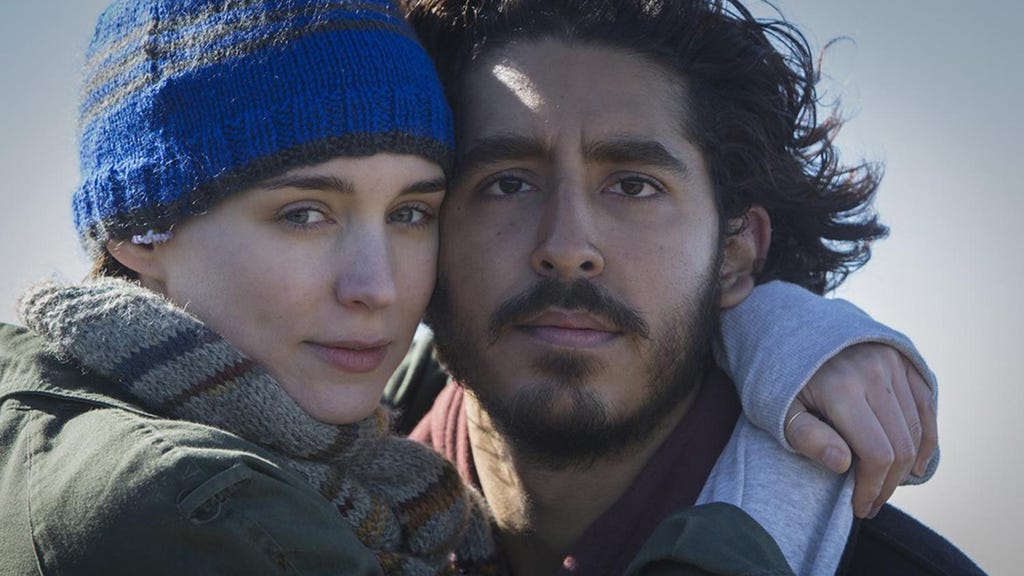The screenwriter opens up to ET about working on the film starring Dev Patel and Nicole Kidman.
It is the heartwarming film that friends and critics alike
have fallen in love with and told you to go see. It has earned Best Picture
nominations at the Golden Globes and the Critics’ Choice Awards, as well as two
nominations at the Screen Actors Guild Awards. And yet, Lion, which is now in theaters, hasn't taken home a trophy at any of these high-profile award shows. Now up for
six Academy Awards later this month, including a nomination for Best Picture, the
film may still go home empty-handed,
despite critical acclaim and standout performances by Dev Patel and Nicole
Kidman.
So why is Lion the film that everybody
can’t stop talking about? For starters, it’s a heart-wrenching true story based
on Saroo Brierley's memoir A Long Way
Home. It follows Saroo (Patel), who was adopted by an Australian couple
(Kidman and David Wenham) after getting separated from his family at age
5. Two decades later, he sets out on a quest to find the family he lost.
“We knew it was beautiful and we knew that people would like it, but this other level of stuff -- the amount of people who are seeing it, this kind of multiple viewing thing, people crying in cinemas, the Oscar nomination -- this is pretty spectacularly unusual and a pleasantly surprising feeling,” Luke Davies, the Oscar-nominated screenwriter behind the film adaptation, tells ET about its success thus far.
This was an exceptional year for films based on true events (see Hidden Figures and Hacksaw Ridge and the loosely autobiographical Moonlight), and while Brierley’s 30-year journey across two continents -- cut down to a two-hour film -- could have been a disaster, it was an overwhelming success thanks to Davies’ deft hand at telling the story.
“The book is basically 10 hours long, and the film is two hours long,” Davies tells ET about the challenges of adapting this story. “So it’s like, what are the choices that you’re going to make that are going to make this a beautiful, thrilling cinematic experience?
“This particular story is so improbable and extraordinary,” he continues. “It’s like some primal, ancient myth or fairy tale. I found that part of it was really not challenging.”
While seemingly improbable, the story is very much true,
with the first half of the film focused on 5-year-old Saroo (scene-stealer
Sunny Pawar) lost and alone in India. The second half sees him as an adult (Patel)
in Australia. However, given the complexity of the journey, there were moments
that didn’t make the final cut.
“There is an absolutely magnificent dance scene where Saroo
and Lucy (Patel’s on-screen girlfriend Rooney Mara) are beginning to fall in
love,” Davies says of an underground dance party that sees their romance start
to blossom. “They start dancing tentatively and they are sort of folding into
each other. Their faces are grazing and they are almost kissing but not quite. It’s
a beautiful scene.”
Other moments omitted from the screen adaptation? Saroo’s
life on the streets as a kid was a lot more complex and dangerous than the film
depicts, and the young boy actually lived in two orphanages throughout his
childhood as opposed to just the one that audiences see on screen.
MORE: Why 'Lion' Is a Love Letter to Nicole Kidman's Kids
While burgeoning romantic scenes and elements of Saroo’s
dangerous life as a kid on the streets were left out of the screen adaptation,
the biggest transgression from real life was Lucy, who is based on Brierley’s
multiple relationships over the years. “Our journey feels like two years of
obsessive behavior, and in real life, it was five years,” Davies says, adding
that Brierley drove a few of his girlfriends “bonkers” during the search for
his mother.
“We actually had two separate girlfriends [in an early draft
of the script], but it was just that problem again of time,” he admits. “It
made the script feel busy.”
Despite the many necessary alterations to Brierley’s life to
transform the story for the screen, he was very much involved in Davies’ scriptwriting
process. The screenwriter also traveled to Australia to meet with Brierley’s
adoptive parents, the friends he grew up with and one of his ex-girlfriends.
But the standout of his explorations was traveling to India, where the story
really begins.
“It was a very intense two- or three-week research period
where I got the job, I flew to India, [Brierley] was there and he took me
around all the places where all the real things happened,” Davies recounts. “I
met his biological mother. That was the most intense experience of the entire
two-year experience on this film. I felt all of her sorrow and joy and grief
and everything together in that one room.”
--Additional reporting
from Darla Murray
